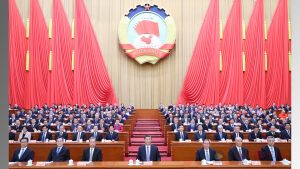
‘No More Bets’ Film Sheds Light on Chinese Cybercrime in Burma
The Chinese crime action movie “No More Bets” has emerged as a massive hit in Chinese theaters this summer, resonating deeply with audiences as it sheds light on the grim reality of Chinese cybercrime operations in neighboring Burma (Myanmar). The film delves into the alarming issue of criminal syndicates luring and kidnapping Chinese citizens, forcing them into servitude for cybercrime groups allegedly connected to the Chinese Communist Party (CCP), as revealed in a U.S. report.
According to data released on August 28 by Maoyan, China’s premier movie box office analysis platform, “No More Bets” has maintained its dominant position in ticket sales for the fourth consecutive weekend, amassing a staggering gross revenue exceeding 3.4 billion yuan (approximately $467 million).
The film’s resonance with the Chinese audience is unmistakable, as cases of Chinese nationals being enticed abroad and trafficked to Burma to become part of cybercrime rings have gained widespread attention.
On June 7, the International Criminal Police Organization (Interpol) issued an orange bulletin to its 195 member countries, warning about the transnational fraud fueled by human trafficking.
Jürgen Stock, secretary general of Interpol, emphasized, “Just about anyone in the world could fall victim to either the human trafficking or the online scams carried out through these criminal hubs.”
Based on actual cases of cyber fraud, “No More Bets” portrays the grim reality of cyber fraud companies attracting job seekers with lucrative offers, only to ensnare them in a web of criminal activity. Victims are coerced into becoming telecom or online fraudsters, putting their lives at risk.
These illicit companies are primarily concentrated in Southeast Asia, including Burma, Cambodia, and the Philippines. Notably, many Chinese cybercrime hubs are located in Burma due to the country’s political instability, the presence of local armed groups, and widespread lawlessness in certain areas. Burma shares its southwestern border with China’s Yunnan province.
Jian Kunyi, director of the Finance and Economics Law School at Yunnan University, revealed that Burma’s armed forces resort to illegal activities such as smuggling, drug trafficking, and human trafficking to fund their operations.
Initial estimates from Chinese police stationed in Yunnan indicate the presence of hundreds of industrial zones engaged in cyber fraud in the town of Myawaddy alone, with at least 1,000 such zones scattered throughout Burma. These operations employ hundreds of thousands of workers, according to a report by China News.
In a shocking incident reported by Chinese media, a millionaire from Guizhou city, Xing Weilin, was allegedly lured to Thailand on a study tour in September 2022. Upon arrival, he claimed to have been knocked unconscious, kidnapped, and trafficked to Burma, where he was forced into telecom fraud for over three months before managing to escape.
Xing Weilin, in a video statement, asserted that his captors profited to the tune of 28 million yuan (about $3.84 million) through cybercrime operations in one year. He argued that the telecom fraud industry is even more lucrative than drug trafficking and carries less risk, which has led to its rapid growth.
Furthermore, Xing Weilin pointed to an influential figure in the casino industry known as She Zhijiang, who goes by numerous aliases, including She Lunkai. Thai police arrested Mr. She in August 2022 on suspicions of running casinos and online gambling establishments in Burma.
Despite Mr. She’s arrest, his casino, known as KK Park, reportedly continues to operate with a workforce of 9,000 employees and daily profits exceeding 100 million yuan (about $13.7 million). Xing Weilin claimed that “if it doesn’t meet that target, everyone will be punished.”
Mr. She is also involved in a $15 billion casino mega-project in Shwe Kokko, a town in Myawaddy, which has become a hub of illegal activities, including human trafficking and drug trafficking, according to Radio Free Asia (RFA).
However, Xing Weilin believes that Mr. She is merely a scapegoat and that other powerful figures operate behind the scenes at KK Park.
Remarkably, Mr. She, a 41-year-old naturalized Cambodian national born in China’s Hunan Province, had reportedly attended high-level meetings in Beijing in 2019 hosted by the All-China Federation of Returned Overseas Chinese, a United Front organization overseen by the United Front Work Department responsible for the CCP’s foreign influence operations.
Reports suggest that Mr. She’s close ties with Chinese officials led to his recruitment by China’s state security, further entangling him in complex geopolitical dynamics.
An U.S. Institute of Peace (USIP) investigation in July 2020 highlighted China’s involvement in the construction of resort towns in Burma’s Karen State, aimed at satisfying China’s illegal gambling market. These projects, which include Saixigang Industrial Zone, Yatai New City Project, and Huanya International Project, have been funded by Chinese state-owned enterprises or businessmen.
The report raised concerns about the CCP’s role in these projects, which allegedly support gambling and telecom fraud companies.
USIP emphasized that Beijing’s motive in Burma extended beyond economic interests. By supporting both the Burmese junta and influential ethnic armed groups, China sought to expand its influence while neutralizing Western support for democracy in the country.
As “No More Bets” continues to captivate audiences, it underscores the pressing need to address transnational criminal networks, human trafficking, and cybercrime while shedding light on the complex web of illicit activities in the region.
















Comments